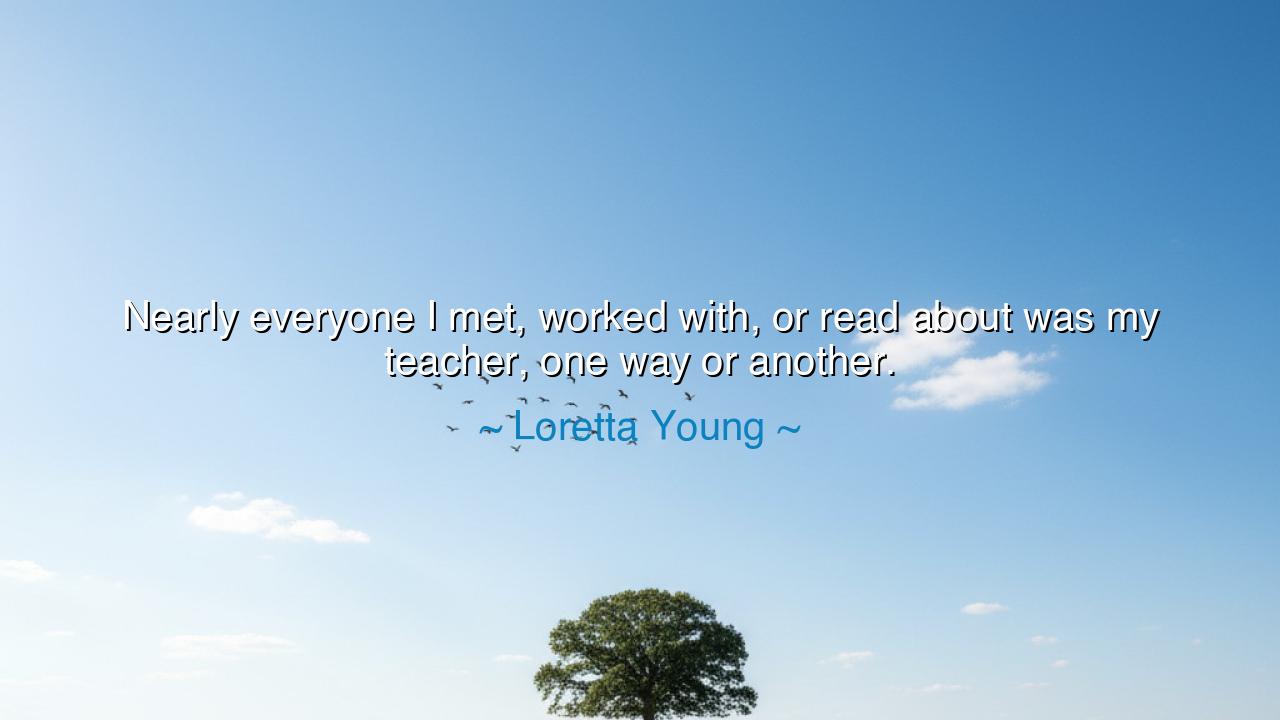
Nearly everyone I met, worked with, or read about was my






Hear the voice of Loretta Young, a woman of grace and endurance, who confessed with humility and wisdom: “Nearly everyone I met, worked with, or read about was my teacher, one way or another.” In these words shines the eternal law that knowledge is not confined to the classroom, nor wisdom bound to the scholar’s desk. Every soul we encounter, every life we read, every hand we work beside carries within it a lesson. Some teach us how to live, others teach us how not to; some show us kindness, others show us trial; but in all, if the heart is open, there is instruction.
The meaning is vast. To call each person a teacher is to live with eyes awake, ears attentive, and spirit humble. Pride blinds us, convincing us that we learn only from the great or the learned. But Loretta Young saw deeper: the beggar in the street may teach endurance, the enemy may teach vigilance, the friend may teach loyalty, the child may teach wonder. The wise do not ask whether a person is worthy to be a teacher; they only ask, “What lesson does this moment hold?”
Consider the story of Abraham Lincoln. Born into poverty, he had little formal schooling, yet he declared that he was taught by the lives of those he met, by the books he borrowed, by the struggles he endured. His teachers were not cloistered professors, but the farmers, rail-splitters, lawyers, and ordinary people whose lives reflected both hardship and hope. From each, he learned—until he became a leader whose words carried the distilled wisdom of a thousand humble lessons.
Or recall the life of Mahatma Gandhi, who studied not only scriptures and law but also the lives of those he encountered. The poor of India became his teachers, showing him the suffering of oppression. The British, in their arrogance, became his teachers, showing him the futility of brute power. Even his opponents taught him patience and strategy. Gandhi did not despise the lessons of pain, nor overlook the lessons of simplicity, but received them all, weaving them into the great cloth of nonviolence that covered a nation.
This truth reveals both the greatness of humility and the folly of arrogance. The arrogant man says, “I have nothing to learn from you,” and thus closes his heart. But the humble man sees that every encounter carries wisdom, and he grows richer by it. To live in this way is to see the world itself as a school, and every day as a lesson unfolding. Truly, the wisest are not those who have met only a few teachers, but those who have found teachers everywhere.
O children of tomorrow, take this lesson as your own: treat each soul you meet as a messenger. Ask yourself: what does this person reveal? If they bring kindness, learn compassion. If they bring hardship, learn patience. If they bring betrayal, learn vigilance. If they bring inspiration, learn courage. In this way, no moment of life is wasted, and no encounter passes without leaving you stronger, wiser, more whole.
Therefore, make this your daily practice: read not only for knowledge, but for wisdom; listen not only to be entertained, but to be taught. Seek the teacher in every conversation, in every page, in every trial. For life itself is the great instructor, and it hides its lessons in every corner. Those who learn from all become masters of themselves; those who refuse remain forever children, no matter their age.
Thus Loretta Young’s words endure as a guiding star: “Nearly everyone I met, worked with, or read about was my teacher, one way or another.” Let her humility be your own, and you will find that the world is rich in wisdom, and that every soul you meet is a gift to your journey.






AAdministratorAdministrator
Welcome, honored guests. Please leave a comment, we will respond soon